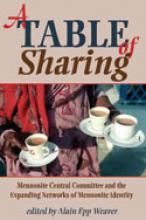Mennonite Central Committee (MCC) recently conducted a re-visioning process called New Wine/New Wineskins: Reshaping MCC for the 21st Century, to review various aspects of the organization. The essays in this collection continue this conversation of exploration of MCC’s work and purpose, and the relationship with its supporting congregations.
In the second chapter, Esther Epp-Tiessen tells the story of how Canadian relief organizations came together to form MCC Canada in 1963. With sympathy for all points of view, she explains the frustrations that led to the vision for a Canadian branch of MCC and how Ontario and western Mennonites had differing loyalties toward the MCC organization based in the U.S. Her clear writing style bodes well for the history of MCC Canada that Epp-Tiessen is writing, to be completed in 2013 as part of the organization’s 60th anniversary celebrations.
Another interesting chapter is “MCC’s relationship with Plain Anabaptists in historical perspective,” by Steven Nolt. Because of MCC’s connection with conscientious objection to war, Old Order Mennonites and Amish had a history of supporting MCC, but the creation of Christian Aid Ministries (CAM) in the 1980s has changed this relationship, as many Plain groups now support CAM more than MCC. Nolt examines the complexities of the relationship between MCC and Plain Anabaptist groups, which is not the same across geographical regions.
Perry Bush has an interesting chapter dealing with the justice imperative, including the creation of Christian Peacemaker Teams (CPT) and its ongoing relationship with MCC. He reports on some frank exchanges between CPT and MCC in the 1990s, when CPT believed that MCC had “gone to seed,” while MCC feared that CPT’s approach might be seen as “patronizing and arrogant.” In more recent years, MCC and CPT have been able to work more co-operatively.
Of the 22 writers, at least four are Canadian. Most of the writers are long-time MCC leaders or recognized Mennonite academics.
This is not a book of praise about MCC. The essays tell the story of MCC from various angles, honestly examining the failures as well as the successes. It is well worth reading.
Barb Draper is the Books & Resources editor for Canadian Mennonite.



Add new comment
Canadian Mennonite invites comments and encourages constructive discussion about our content. Actual full names (first and last) are required. Comments are moderated and may be edited. They will not appear online until approved and will be posted during business hours. Some comments may be reproduced in print.